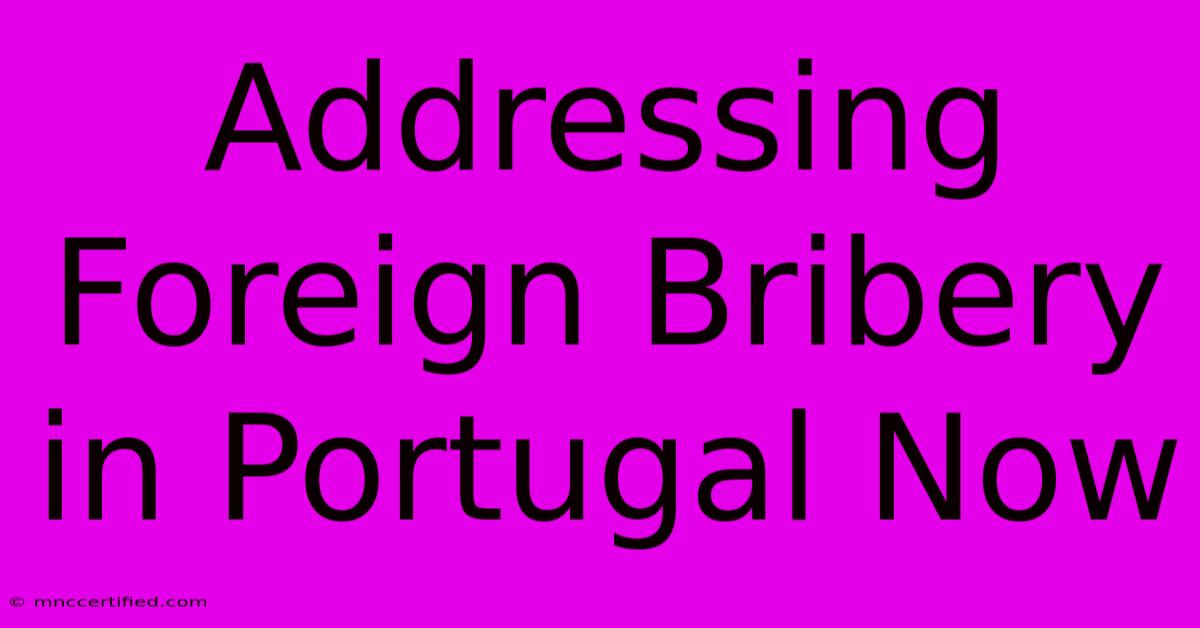Addressing Foreign Bribery In Portugal Now

Table of Contents
Addressing Foreign Bribery in Portugal Now: A Comprehensive Guide for Businesses
Foreign bribery poses a significant risk for companies operating internationally, including those with dealings in Portugal. Understanding and mitigating this risk is crucial for maintaining a strong reputation, avoiding hefty fines, and ensuring long-term business success. This article provides a comprehensive overview of foreign bribery laws in Portugal, practical strategies for compliance, and the potential consequences of non-compliance.
Understanding the Legal Landscape of Foreign Bribery in Portugal
Portugal, like many other countries, has robust legislation in place to combat foreign bribery. The primary legislation addressing this issue is rooted within its criminal code and reflects international standards set by the Organisation for Economic Co-operation and Development (OECD) Convention on Combating Bribery of Foreign Public Officials in International Business Transactions. This means that Portuguese companies and individuals can be prosecuted for bribery offenses committed anywhere in the world.
Key aspects of Portuguese law concerning foreign bribery include:
- Broad definition of bribery: The law covers a wide range of actions, including offering, promising, giving, or receiving a bribe to influence a foreign public official in their official capacity. This includes indirect bribery through intermediaries.
- Strict liability: Companies can be held liable for the actions of their employees, even if senior management wasn't directly involved. This emphasizes the importance of robust internal controls.
- Severe penalties: Penalties for foreign bribery in Portugal can be severe, including hefty fines, imprisonment for individuals, and potential debarment from public contracts.
Practical Strategies for Compliance: Building a Robust Anti-Bribery Program
Building a robust anti-bribery program is not just about complying with the law; it's about fostering a culture of ethical conduct within your organization. Key elements of an effective program include:
1. Risk Assessment: Identifying Potential Vulnerabilities
A thorough risk assessment is the foundation of any effective compliance program. This involves identifying the specific risks your business faces in Portugal and other regions, considering factors such as:
- Industry: Some industries are inherently more susceptible to bribery.
- Geographic location: Certain regions may have a higher risk of corruption.
- Business practices: Specific business practices can increase vulnerability to bribery attempts.
2. Implementing Internal Controls: Establishing Clear Procedures
Once risks are identified, robust internal controls are essential. This includes:
- Clear policies and procedures: Develop written policies prohibiting bribery and outlining acceptable conduct. These policies should be readily accessible to all employees.
- Due diligence: Conduct thorough due diligence on business partners and intermediaries to mitigate risks.
- Financial controls: Implement strong financial controls to prevent the misuse of funds.
- Whistleblowing mechanism: Establish a confidential and secure mechanism for employees to report suspected bribery.
- Training and education: Regular training for all employees on anti-bribery laws and company policies is crucial.
3. Monitoring and Enforcement: Ensuring Compliance
Ongoing monitoring and enforcement are vital to ensure the effectiveness of your anti-bribery program. This involves:
- Regular audits: Conduct regular audits to assess compliance with policies and procedures.
- Review of transactions: Scrutinize transactions for any indication of potentially corrupt practices.
- Disciplinary action: Implement clear disciplinary procedures for employees who violate anti-bribery policies.
Consequences of Non-Compliance: Protecting Your Business
Failing to address foreign bribery risks can have severe consequences for your business, including:
- Criminal prosecution: Both companies and individuals can face criminal charges.
- Significant fines: Fines can be substantial, significantly impacting profitability.
- Reputational damage: A bribery scandal can severely damage your company's reputation, impacting investor confidence and business relationships.
- Loss of business opportunities: Governments and businesses may exclude companies with a history of bribery from future contracts.
Conclusion: Prioritizing Ethics for Long-Term Success
Addressing foreign bribery in Portugal requires a proactive and comprehensive approach. By implementing robust anti-bribery measures, businesses can not only comply with the law but also cultivate a culture of ethics and integrity, protecting their reputation and ensuring long-term success in the Portuguese and international markets. Seeking expert legal advice is crucial in navigating the complexities of anti-bribery legislation and developing a tailored compliance program. Remember, proactive prevention is far more cost-effective and less damaging than reacting to a crisis.

Thank you for visiting our website wich cover about Addressing Foreign Bribery In Portugal Now. We hope the information provided has been useful to you. Feel free to contact us if you have any questions or need further assistance. See you next time and dont miss to bookmark.
Featured Posts
-
Mike Tyson Vs Jake Paul Full Fight Card
Nov 16, 2024
-
Support For Davina Mc Calls Diagnosis
Nov 16, 2024
-
Landman Billy Bobs Life Story
Nov 16, 2024
-
Renters Insurance Winston Salem Nc
Nov 16, 2024
-
Davina Mc Call Recovering Post Surgery
Nov 16, 2024